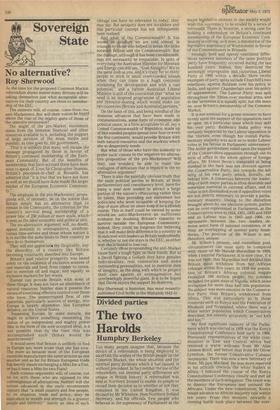Sovereign State
No alternative?
Roy Sherwood
As the time tor the proposed Common Market referendum draws nearer many Britons will be asking themselves just what acceptable alternatives for their country are there to membership of the EEC.
The answers will, of course. come from the anti-Marketeers. But will their voices be heard above the roar ot the mighty guns of those of the opposite persuasion?
The might of the pro-Market movement stems from the immense financial and other resources available to it, including the support of large sections of the mass media and possibly, as time 4oes by, the government. . Thus it is unlikely that many will escape the message propagated by those in favour of Britain's continued membership of the European Community. But of the benefits of membership that have accrued there have been none to speak of. Even Sir Christopher Soames, Britain's placeman-in-chief at Brussels, has admitted that "it is true that we have not done as well as we should have done inside the larger market of the European Economic Community."
The emphasis in the pro-Marketeers' propaganda will, of necessity, be on the notion that Britain simply has no alternative than to remain in the Community, the criterion for the country's survival being membership of a power bloc of 250 million or more souls, which is seen as the ideal economic and political unit.
The no-alternative argument will, no doubt, appeal instantly to unimaginative, unadventurous time-servers and those whose nature it is to ascribe the same limits to their country as they do to themselves.
They will not appreciata the illogicality, nay, the absurdity, of a country like Britain becoming voluntarily absorbed into Europe.
Britain's past relative prosperity was based solely on the existence of exclusive sources of raw materials and food, from copper to cocoa, not to mention oil and sugar, and equally as exclusive markets for her wares. Europe can provide Britain with none of these things. It does not have an abundance of natural resources. Neither does it possess the means of exercising effective control over those who have. The uninterrupted flow of raw materials, particularly sources of energy, into Europe is largely dependent, like European defence, on the United States.
Supposing Europe, by some miracle, did begin to achieve something resembling the
status of an independent and mighty power bloc in the form of the now accepted ideal, is it not possible that by the time this was accomplished such thines would be anachronistic?
It would seem that Britain is unlikely to find in Europe any more scope than she has now. The more so because most of the European countries manufacture the same articles as one another and so far for Britain European trade has merely meant exchanging a Mini for a Fiat, or has it been a Mini for two Fiats?
Such counter-arguments will, of course, cut no ice with those who are opposed to the contemplation of alternatives. Neither will the notion advanced in the early seventeenth century that "a small country and few people, by its situation, trade and policy, may be equivalent in wealth and strength to a greater people and territory." Surely an idea of such vintage can have no relevance to today, they may say. But antiquity does not invalidate and this particular concept has not infrequently been realised.
And what of the Commonwealth? It has waved us goodbye we are told almost in triumph by those who helped to break the links between Britain and the Commonwealth. But the damage, although it has been considerable, may not necessarily be irreparable. In spite of everything the Australian Minister for Minerals and Energy can still say, "God Almighty! We're the same mob as you, and it's crazy for so many people to stick in small overcrowded islands when they can come to a hugh continent screaming for development and with a vast potential." and a former Australian Liberal Minister is still of the conviction that "what we need is an inspired programme of population and resource-sharing which would make our two countries [Britain and Australia] partners."
On the basis of this, and being mindful of the immense advances that have been made in communications, some form of economic and political union, in a form acceptable to all, say a United Commonwealth of Republics, made up of like-minded peoples spread over four or even the five continents, would provide Britain with both natural resources and the markets which she so desperately needs.
But what of those who have the audacity to prefer such visions to the negative no-alternative proposition of the pro-Marketeers? Will they, one wonders, be able to resist the contagion of defeatism that is implicit in the no alternative argument?
There is also the painfully obvious truth that the main political parties in Britain, at both parliamentary and constituency level, have for many a year now tended to attract a large portion of the nation's offscouring rather than its talent, thus providing not statesmen but politicians who seem incapable of keeping the ship of state afloat let alone keep it on a chosen .course. This in itself could be viewed by some would-be anti-Marketeers as sufficient evidence for doubting Britain's capacity to survive outside the European Community. Indeed, they could be forgiven for believing that it will make little difference to a country as ill endowed with leaders as Britain undoubtedly is, whether or not she stays in the EEC, as either way she is bound to lose out.
Certainly th'ose propounding the anti-Market cause have a tough fight on their hands. But as a David fighting a Goliath they have genuine individualists, real visionaries and some outstanding personalities, not to mention men of integrity, as the sling with which to project their case against an unimaginative but overbearingly powerful giant. It is to be hoped that David enjoys the support he deserves.
Roy Sherwood, a historian, has most recently published Civil Strife in the Midlands 1642-51


































 Previous page
Previous page